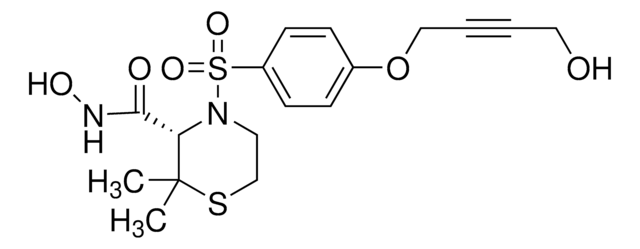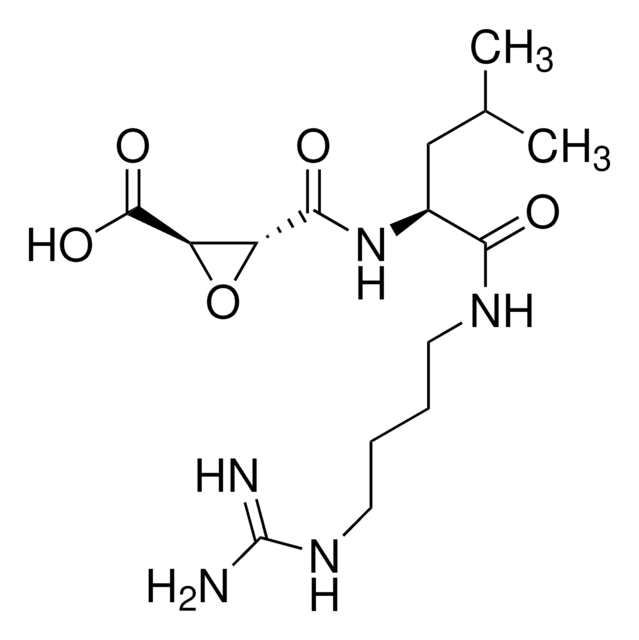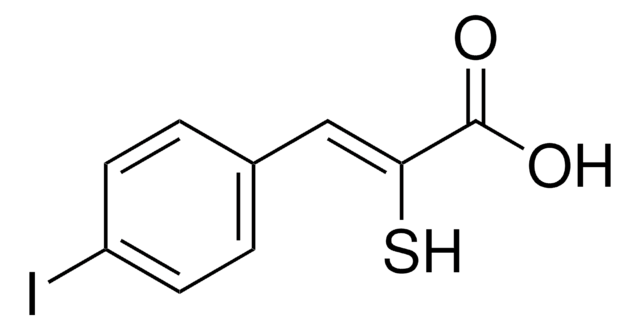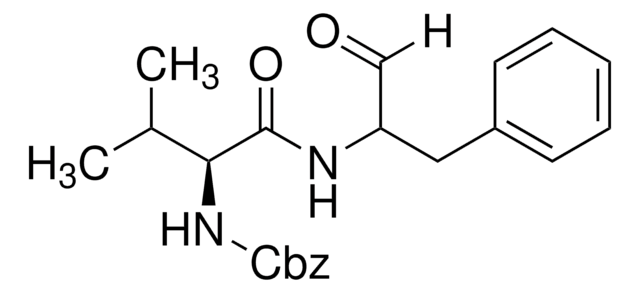208733
Calpain Inhibitor Set
The Calpain Inhibitor Set controls the biological activity of Calpain. This small molecule/inhibitor is primarily used for Protease Inhibitors applications.
Sinonimo/i:
Calplain inhibitor
Autenticatiper visualizzare i prezzi riservati alla tua organizzazione & contrattuali
About This Item
Codice UNSPSC:
12352200
NACRES:
NA.77
Prodotti consigliati
Livello qualitativo
Stato
solid
Potenza
8 nM Ki
Produttore/marchio commerciale
Calbiochem®
Condizioni di stoccaggio
OK to freeze
desiccated
protect from light
Condizioni di spedizione
ambient
Temperatura di conservazione
−20°C
Descrizione generale
Calpains are a family of calcium-dependent thiol-proteases that act on a wide variety of cytoskeletal, membrane-associated, and regulatory proteins. There are two major isoforms: calpain I (µ-form) and calpain II (m-form), which differ in their calcium requirement for activation Calpains are composed of heterodimers of 80 kDa and a 30 kDa subunits. The 80 kDa unit has the catalytic site and is unique to each isozyme, whereas the 30 kDa unit is the regulatory subunit and is common to both µ- and m-isozymes.
More recently, attention has been focused on the pathological significance of calcium accumulation in the central nervous system following cerebral ischemia and traumatic brain injury. Over-activation of NMDA, kainate, and AMPA receptors in the brain leads to sustained influx of Ca2+ through the voltage-gated calcium channels. Overexpression of calpains has been positively linked to both acute and chronic neurodegenerative processes including ischemia, trauma, and Alzheimer′s disease. In Alzheimer′s disease the ratio of active (76 kDa) to inactive (80 kDa) µ-calpain is reported to be much higher Calpain-dependent proteolysis is usually the late-stage common pathway towards cell death induced by excitotoxic compounds, hence, a selective inhibition of calpains to limit neuronal damage appears to be a viable therapeutic measure.
More recently, attention has been focused on the pathological significance of calcium accumulation in the central nervous system following cerebral ischemia and traumatic brain injury. Over-activation of NMDA, kainate, and AMPA receptors in the brain leads to sustained influx of Ca2+ through the voltage-gated calcium channels. Overexpression of calpains has been positively linked to both acute and chronic neurodegenerative processes including ischemia, trauma, and Alzheimer′s disease. In Alzheimer′s disease the ratio of active (76 kDa) to inactive (80 kDa) µ-calpain is reported to be much higher Calpain-dependent proteolysis is usually the late-stage common pathway towards cell death induced by excitotoxic compounds, hence, a selective inhibition of calpains to limit neuronal damage appears to be a viable therapeutic measure.
Contains 5 mg of ALLN (Cat. No. 208719), 25 mg of Calpain Inhibitor III (Cat. No. 208722), 5 mg of Calpeptin (Cat. No. 03-34-0051), 1 mg of EST (Cat. No. 330005), and 5 mg of PD 150606 (Cat. No. 513022).
Azioni biochim/fisiol
Cell permeable: yes
Primary Target
calpain 1, calpain 2
calpain 1, calpain 2
Reversible: no
Confezionamento
Packaged under inert gas
Attenzione
Toxicity: Multiple Toxicity Values, refer to MSDS (O)
Altre note
Johnson, G.V.W., and Guttmann, R.P. 1997. BioEssays19, 1011.
Kampfl, A., et al. 1997. J. Neurotauma14, 121.
Sorimachi, H., et al., 1997. Biochem. J.328, 721.
Bartus, R.T., et al. 1995. Neurol. Res.17, 249.
Wang, K.K.W., and Yuen, P-W. 1994. Trends Pharmacol. Sci.15, 412.
Saito, K., et al. 1993. Proc. Natl. Acad. Sci. USA90, 2628.
Goll, D.E., et al. 1992. BioEssays14, 549.
Kampfl, A., et al. 1997. J. Neurotauma14, 121.
Sorimachi, H., et al., 1997. Biochem. J.328, 721.
Bartus, R.T., et al. 1995. Neurol. Res.17, 249.
Wang, K.K.W., and Yuen, P-W. 1994. Trends Pharmacol. Sci.15, 412.
Saito, K., et al. 1993. Proc. Natl. Acad. Sci. USA90, 2628.
Goll, D.E., et al. 1992. BioEssays14, 549.
Note legali
CALBIOCHEM is a registered trademark of Merck KGaA, Darmstadt, Germany
Codice della classe di stoccaggio
11 - Combustible Solids
Certificati d'analisi (COA)
Cerca il Certificati d'analisi (COA) digitando il numero di lotto/batch corrispondente. I numeri di lotto o di batch sono stampati sull'etichetta dei prodotti dopo la parola ‘Lotto’ o ‘Batch’.
Possiedi già questo prodotto?
I documenti relativi ai prodotti acquistati recentemente sono disponibili nell’Archivio dei documenti.
I clienti hanno visto anche
Il team dei nostri ricercatori vanta grande esperienza in tutte le aree della ricerca quali Life Science, scienza dei materiali, sintesi chimica, cromatografia, discipline analitiche, ecc..
Contatta l'Assistenza Tecnica.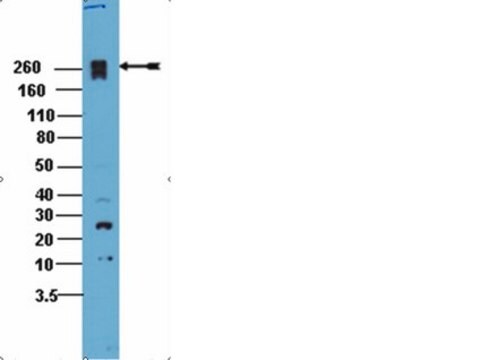
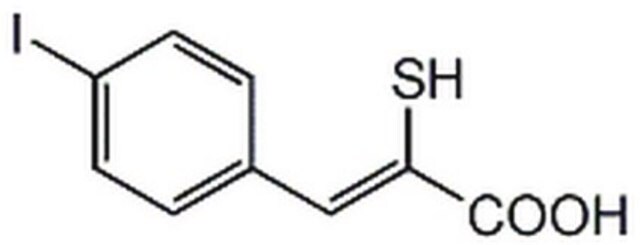


![1,1′-[4,8-Bis[5-(2-ethylhexyl)-2-thienyl]benzo[1,2-b:4,5-b′]dithiophene-2,6-diyl]bis[1,1,1-trimethylstannane]](/deepweb/assets/sigmaaldrich/product/structures/611/912/a638a6fe-ca7b-4674-8023-df4c0921a9fd/640/a638a6fe-ca7b-4674-8023-df4c0921a9fd.png)


